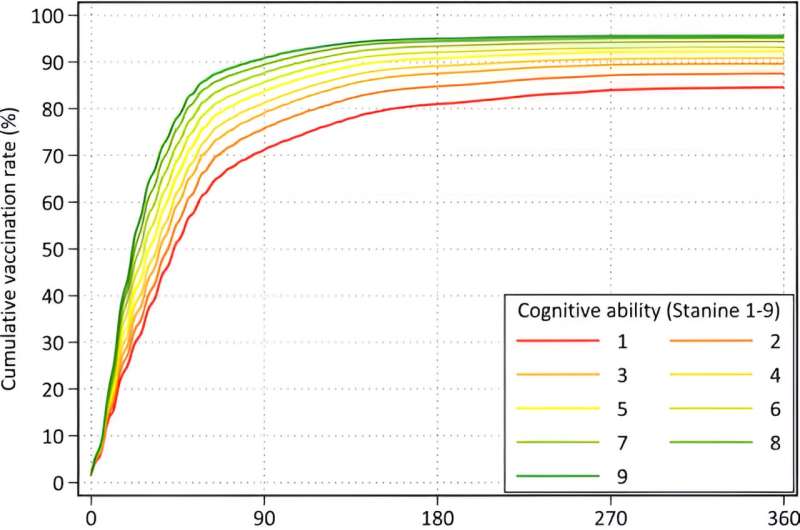This article has been reviewed according to Science X's editorial process and policies. Editors have highlighted the following attributes while ensuring the content's credibility:
fact-checked
peer-reviewed publication
trusted source
proofread
Difficult decisions found to lead to unequal vaccination rates

There was a significant difference in the speed with which different groups were vaccinated against COVID-19. One explanation could be that people absorb information and make decisions in different ways. A new study shows that among people with the highest cognitive ability, 80% had been vaccinated within 50 days. Among those with the lowest cognitive ability, it took 180 days to achieve the same vaccination rate.
"This is important knowledge for future situations in which authorities want to reach a broad public to encourage them to get vaccinated or adopt other health measures, for example. If we are to have equal care for all, we need to take into account the different ways people absorb information," says Mikael Elinder, Associate Professor in Economics at Uppsala University and one of the researchers behind the study.
The study, now published in the Journal of Health Economics, is based on the results of cognitive ability tests from the military service conscription process. The study covers 750,000 men and 3,000 women born between 1962 and 1979. The test results, which are graded on a nine-point scale, have been compared with vaccination statistics from the Public Health Agency of Sweden.
There are major differences between individuals with the highest and lowest scores on these tests of cognitive ability. Among the highest performers (group 9), 80% had already been vaccinated after 50 days, while among the lowest performers (group 1) this figure was only reached after 180 days.
"Most Western countries wanted their populations to be vaccinated as soon as possible. It was seen early on that vaccination rates varied considerably between different socio-economic groups. We wanted to investigate whether there was a link to cognitive ability or whether other factors caused the differences and led to people hesitating to get vaccinated," explains Oscar Erixon, Researcher in Economics at Uppsala University and one of the people responsible for the study.
One example that deviates from the national statistics is Region Uppsala, in Sweden. Once the priority groups had been vaccinated, the region made vaccination appointments for all individuals in the 50–59 age group. They received a letter inviting them to an appointment to get vaccinated, and all they had to do was show up.
The result was rapid and high vaccination rates even among those with lower cognitive ability. In Uppsala, it took only 40 days for that group to reach an 80% vaccination rate. This was therefore 140 days faster than the national vaccination rate.
"Logging on to a website, finding an appointment, booking it, going there and getting vaccinated may have been too many steps for some people. A simple measure, such as pre-booking vaccination appointments, proved to be a powerful tool to speed up vaccinations in both groups," notes Mattias Öhman from Uppsala University, also one of the researchers behind the study.
"It shows that some of the inequalities in vaccination behavior can be addressed by better designing vaccination campaigns. As it is known that the group with lower cognitive ability was also hit harder by COVID-19, such a measure is likely to contribute to more equal health outcomes. Faster vaccination rates are also likely to help bring an end to the pandemic more effectively," adds Erixson.
More information: Mikael Elinder et al, Cognitive ability, health policy, and the dynamics of COVID-19 vaccination, Journal of Health Economics (2023). DOI: 10.1016/j.jhealeco.2023.102802





















